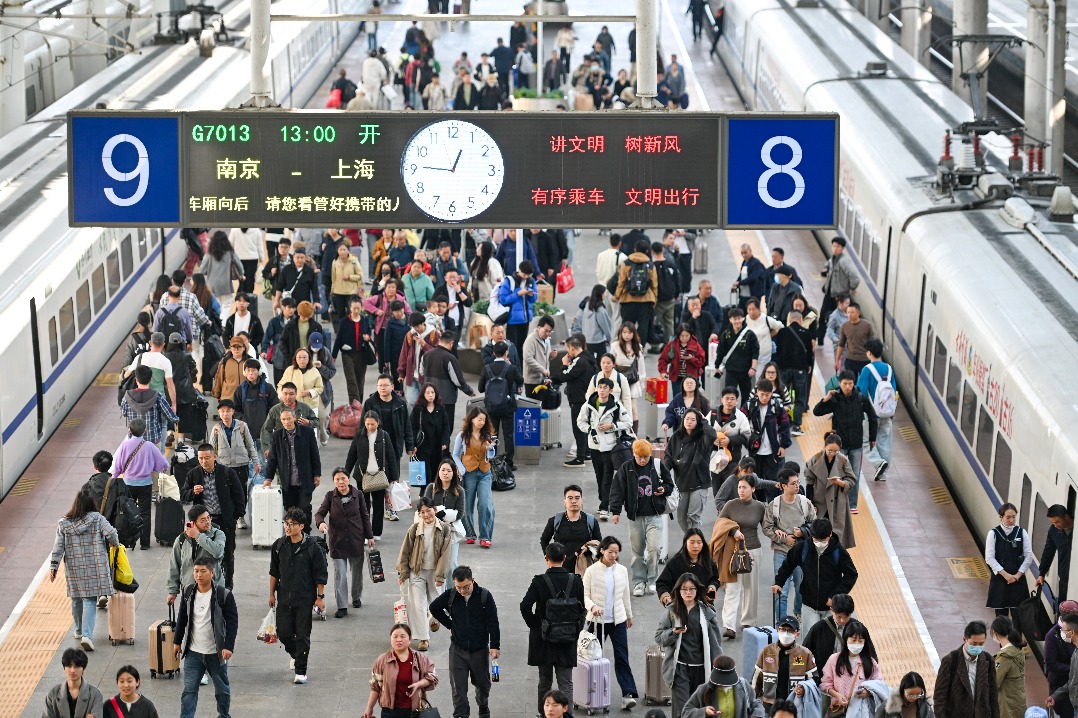Advisers call for greater protection of couriers' rights
Delegates to the recently concluded two sessions discussed employment issues related to the emerging delivery sector. Luo Wangshu and Cao Yin report.

An old Chinese saying states that when a person wakes up in the morning and opens the door to embrace a new day, seven items are necessary and unavoidable in his or her life: firewood, rice, oil, salt, soy sauce, vinegar and tea.
The saying has been "updated "recently, and it is now widely accepted that the seven items have been integrated into one thing — a parcel.
The adjusted saying illustrates the importance of parcels in Chinese people's lives nowadays.
Although the delivery industry has boomed in the past decade, and many people rely heavily on parcels to maintain their normal lives, it is easy to forget the most important part of the network — the millions of couriers who transport the items to their recipients.
In China, these essential people usually work busy schedules and handle heavy workloads. For example, in big cities such as Beijing, each courier usually collects and delivers 200 to 300 parcels a day, even during off-peak periods.
They often wear colorful uniforms and ride electric bikes through the streets and communities. People call them "busy bees" in honor of their hard work.
Sometimes, they rush to meet their schedules and aim to deliver a large number of parcels, raising the risk of traffic accidents. Sometimes they work overtime to complete deliveries. Occasionally, they are subject to unreasonable complaints.
Online debate
Recently, a sorter on a parcel distribution line died while working at midnight, triggering heated online debate about paying attention to the protection of couriers' legal rights.
There are more than 4 million couriers in China, and they are employed in what are called the "new industries". Their flexible employment model differs from traditional working practices, which poses challenges for the protection of rights and interests.
During the recently concluded two sessions, China's most important annual political event, deputies to the National People's Congress and top advisers at the Chinese People's Political Consultative Conference National Committee discussed the issue and called for better protection of the couriers' rights.
Ma Junsheng, former head of the State Post Bureau of China and a member of the 14th National Committee of the CPPCC, suggested a stipulation that parcel delivery stations must buy work-related injury insurance for all couriers to better protect their legal rights.
Such rights and the interests of couriers cannot be ignored, and the sector's safety supervision capacity should be strengthened, he said. Ma also suggested that grassroots parcel stations should buy accident insurance for couriers, and that policy design for the sector's regulators be strengthened to ensure that companies fulfill their responsibilities, improve inspections and optimize the process of collecting money in case of accidents.
Zhao Mingzhi, a mail delivery worker with China Post Group and a deputy to the 14th National People's Congress, was also concerned about the protection of couriers' rights.
She suggested greater publicity to raise awareness of the social insurance system and ensure that couriers better understand their rights.
In addition, she proposed the creation of a committee to provide legal counsel for couriers.
Greater efforts
Some parcel delivery companies have already taken action to protect the rights of front-line workers.
"Employers should make good use of insurance as a tool, and society should provide good insurance policies so people who work under the flexible employment model can be cared for when they are old and sick, and can make claims through their commercial insurance policies if bad things happen," said Cao Peng, chairman of the technology committee at e-commerce platform JD, who is also a member of the 14th National Committee of the CPPCC.
"JD has signed labor contracts with more than 300,000 front-line workers, such as couriers and sorters, providing them with five types of insurance, including commercial insurance and housing stipends," he said, calling on peer companies to pay more attention to couriers' legal rights.
Zheng Gongcheng, a deputy to the NPC and president of the China Society of Social Security, said he has always studied and paid attention to legislation in the sphere of people's livelihoods.
During the recent NPC meeting, he put forward a number of legislative proposals, such as promoting the compilation of a labor code, a proposed series of regulations to oversee employment issues. He also proposed reforming the work-related injury insurance system.
"The current work-related industry insurance system has become unsuitable for the development of new types of businesses and also increasingly unsuitable for the reemployment of retirees. Couriers and migrant workers have risky jobs. If they don't have work-related injury insurance, they cannot claim compensation if they are hurt at work. So, the system must change," he said.
Work-related injury coverage is one type of social insurance in China.
It is mandatory for employers to buy five types of social insurance — including work-related injury insurance — for their employees.
However, this often results in complicated employment relationships between couriers and parcel delivery companies. In the emerging industry, some couriers don't sign labor contracts with companies directly. Rather, they sign contracts with a third party, which encourages them to buy their own commercial insurance. However, many couriers prefer to save the money and take the risk.
"Work-related injury insurance can provide substantial protection for couriers. However, the design of such insurance is unsuitable for people who work under the flexible employment model," said Zhao Guoqun, director of the Post Service Development Research Center at Beijing University of Posts and Telecommunications.
"It greatly raises the companies' costs if they buy all the different types of social insurance for their couriers. China's parcel delivery sector has meager profits because of the cutthroat competition," she added.
"Companies are very sensitive to such costs. In addition, the courier group usually has high turnover, causing some companies to be more reluctant to pay extra costs for couriers' insurance."
Challenges, respect
Some couriers come from the rural areas and as migrant workers they may have already bought social insurance in their hometown. The complications of the flexible employment model pose challenges for the protection of couriers' rights and interests, Zhao said.
She called on companies to cease underhand practices and to return to fair competition and virtuous development.
"When parcel delivery companies are making efforts to build their brand and improve the service quality instead of conducting low-price battles to win customers, it is time for them to be willing to invest in human capital — couriers," she said.
Zhao also called on society as a whole to respect couriers and regard them as professionals in order to build a virtuous circle.
China's postal and express delivery sector has undergone rapid development over the past decade.
The volume of deliveries has risen nearly twentyfold from 5.6 billion in 2012 to 110.5 billion last year, while parcel delivery services have been extended to 95 percent of administrative villages, according to the State Post Bureau of China.
Xu Wei contributed to this story.


































